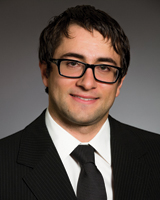Legal professional Patrick Actis Perinetto completed his Master of Laws (LLM) at the UK’s University of Cambridge in 2012, with a specialization in European law. He’s now returned to his home country, Italy, where he’s an associate at a legal practice in Rome, advising companies on a range of issues relating to Italian and European law. Ahead of his appearance on the alumni panel at the QS World Grad School Tour in Milan, he shares his experience of studying law at Cambridge, and advice for others considering a Master of Laws program.
 What motivated you to enrol in a Master of Laws (LLM)?
What motivated you to enrol in a Master of Laws (LLM)?
I applied for the University of Cambridge’s Master of Laws program, with a focus on European law, because it offered the best opportunity for me to satisfy the interests I first developed in school. While studying at the University of Turin, I developed a great interest in the study of European law and I took every course offered by the university on the subject. This fascination grew during my two years of legal apprenticeship at the District Solicitor General’s Office of Turin.
After leaving the District Solicitor General’s Office, I knew that I was at a crucial point in my legal career and it seemed natural, given the growing relevance of European law in both the world and national contexts, as well as my professional and academic interests, to focus my studies there. When I looked into possible programs, it became clear to me that a degree from a prestigious university such as the University of Cambridge would provide everything I was looking for academically and would also open up a wider and better range of employment opportunities.
Why did you choose the University of Cambridge?
I had aspired to become a lawyer at an international law firm for quite some time, so I knew that firms only look at candidates with outstanding academic backgrounds. Surely, a Master of Laws from Cambridge would show that I had the academic credentials needed for my dream job. However, my choice of law at Cambridge was really about much more than a credential. I was quite fascinated by the idea of studying at one of the world’s best universities; I had always dreamed of studying abroad in an intellectually stimulating environment; and I couldn’t pass up the opportunity to build the skills I would need to become an excellent lawyer in such an epicenter of intellectualism.
Overall, I knew that studying law at Cambridge assured a certain type of practical and academic preparation that would be useful in every legal profession. This sense was heightened considering that I applied for the LLM with a specialization in European law, a field that has recently emerged as indispensable to the study and practice of law. Finally, I knew that studying law in England would help me improve my language skills, which was important because of my goal to work for an international law firm.
What were the key lessons you learned from your LLM?
The formal university experience helped me build my own strategies for studying, handling the pressure of being a lawyer, and preparing to meet important challenges. However, I really think the most important lessons came from my colleagues; the people from all over the world whom I was fortunate enough to meet while studying there. I was constantly exposed to brilliant people and vastly different perspectives not only in an academic or professional context, but also as it came to life more generally. An experience of this kind is not just about studying, but about opening your mind.
What was most enjoyable about your LLM experience?
Besides the people I met, what I enjoyed most about studying law at Cambridge was the extremely high quality of the learning. The LLM classes were all taught by distinguished scholars and experts in their fields. These professors somehow taught lessons about practical experience and theoretical knowledge together in the most excellent lectures. That experience alone was truly amazing. Socially, I enjoyed being a member of my college football team. I was lucky to have an outlet for the pressures of school in the form of hard-fought afternoon matches against other colleges, and evenings hanging out with my teammates.
Nevertheless, being at Cambridge did not come without its challenges. Being Italian, the most difficult aspect of my stay in the UK was the weather: living for weeks in a place where the sun disappears at four in the afternoon can be very disturbing. Not surprisingly, the food was also an issue, but I tried to cope by cooking for myself most of the time.
What have you done since completing your LLM?
Immediately after the completion of my LLM, I sent applications to a number of international law firms and started interviewing for jobs. Shortly afterwards, I began working for Cleary Gottlieb Steen & Hamilton LLP. I am currently a second-year associate, and resident of Cleary’s Rome office, where I focus on a wide range of issues arising under European law and European and Italian antitrust law. The skills I acquired during my LLM gave me the opportunity to work for one of the most renowned and important international firms. This has allowed me to settle into a practice area and start developing expertise in the fields of pharmaceutical, telecommunications, media and administrative law.
How have you applied what you learned during your LLM?
At Cleary, I practice EU and national competition law on a daily basis. On several occasions, I have had to go back to my LLM notes to reference things I learned during my year at Cambridge and to put ideas gleaned from spectacular lectures into practice.
What advice would you give to others considering a similar path?
Just do it. It will be an amazing experience, which will be worthwhile no matter what you decide to do afterwards!
